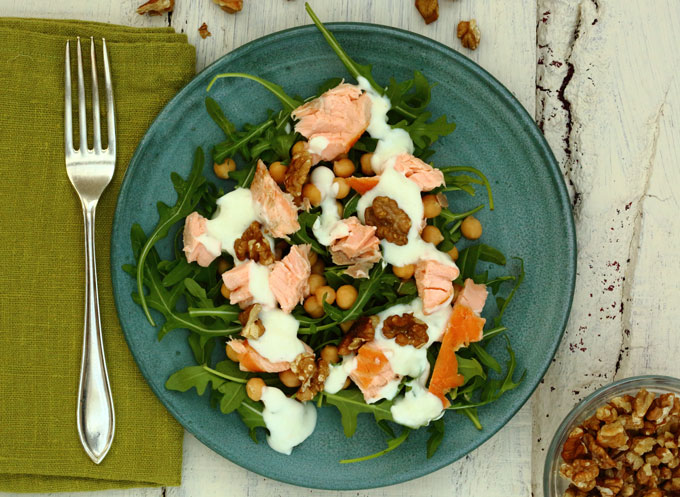If someone says ‘brain food’ what’s the first thing you think of? My guess is that it’s going to be fish – and probably oily fish. And if it’s oily fish, it’s got to be salmon. It’s become synonymous with healthy eating in recent decades. And it’s not just the brain that salmon can help. The trend for eating more oily fish started in the 1970s when researchers in Greenland realised that the Eskimos (who eat tons of oily fish) had a very low instance of heart disease. Subsequently, consumption of oily fish has been linked to lower risk of many cancers, asthma, diabetes, high blood pressure, macular degeneration, MS and rheumatoid arthritis. It’s not surprising that salmon has overtaken cod to be Britain’s most popular fish, is it?
Here’s the science: the brain is 60% fatty acid – made up of docosahexaenoic acid (DHA) and eicosapentanoic acid (EPA) aka omega-3 fats. These essential fatty acids coat our brain cells, protecting them from injury and inflammation. As we age, the supply of DHA and EPA we were born with declines, leaving us vulnerable to memory loss, mood disorders, cognitive decline, reduced brain volume and Alzheimer’s disease. The body can’t manufacture these fats by itself, so they have to come from food sources. One of the richest sources of both these fats is salmon.
A study published last week by the University of Illinois shows that older adults at risk of late-onset Alzheimer’s disease (ie those with the APOe4 gene) who consumed more omega-3 fatty acids had better cognitive flexibility — the ability to efficiently switch between tasks. “Recent research suggests that there is a critical link between nutritional deficiencies and the incidence of both cognitive impairment and degenerative neurological disorders, such as Alzheimer’s disease,” said Professor Aron Barbey, who led the study “Our findings add to the evidence that optimal nutrition helps preserve cognitive function, slow the progression of aging and reduce the incidence of debilitating diseases in healthy aging populations.” Which is what the Kale & Cocoa ‘Eat Well Age Well’ philosophy is all about, of course.
There’s no need to go overboard on salmon – one or two portions a week is all we need. There are plant-based sources of EPA and DHA too, particularly walnuts and flaxseeds. And for all salmon’s apparent health benefits, some argue we shouldn’t be eating it at all – wild fish stocks are at risk, and farmed salmon poses a whole other set of problems. If you really want to drill down on the arguments against farmed salmon, this PETA article is pretty graphic: http://www.peta.org/living/food/top-10-reasons-eat-salmon/ and headlines like these http://www.telegraph.co.uk/news/health/news/11095351/Farmed-salmon-has-more-fat-than-pizza.html are likely to put you off too. Farmed salmon certainly contains more saturated fat than wild, but I found this article helpful in deciding whether I should really be eating farmed or wild salmon http://authoritynutrition.com/wild-vs-farmed-salmon/. The Marine Stewardship Council seems to certify both wild and farmed salmon (CHECK) and I try to eat both. I’ll buy wild salmon when it’s on offer, and organic farmed salmon if I can. I know neither are cheap, but I rarely eat meat so splashing out on fish seems OK. And I do love it, which helps. Despite salmon’s ubiquity these days, it always feels luxurious.
This recipe is super-speedy, more of a compilation job than a recipe really. I can get all the ingredients on my way home from work and put it together in minutes. It’s light and summery, but filling enough to be a main meal. I served this to last-minute guests during the week, with the freekah salad Annabel posted on the blog a few weeks ago, and it was a hit.
AFTER-WORK SALMON SALAD WITH HORSERADISH AND YOGHURT DRESSING (serves 4)
- 400g cooked salmon (kiln roasted has more flavour than poached)
- 400g tin of chickpeas, drained and rinsed
- 1 bag rocket leaves (or a mix of rocket and watercress)
- 1 ripe avocado, chopped (optional)
FOR THE DRESSING:
- 4 tbs plain yoghurt
- 2 tsp horseradish sauce (or to taste – every brand seems to vary wildly in potency)
- 2 tsp lemon juice
- 2 tsp wholegrain mustard
- 1 tsp finely chopped dill (optional)
Whisk together the dressing ingredients and season well. Dump the salad leaves in a wide, shallow bowl, add chickpeas (and avocado if using) and flake the salmon fillets over the top. Drizzle over the dressing and serve any extra on the side. A few toasted walnuts on top are a nice addition if you really want to ramp up the Omega-3!
Susan



[…] are an inexpensive age-well superfood. Check out these recipes on the blog for SMASH fish – salmon, mackerel, anchovies,sardines, […]